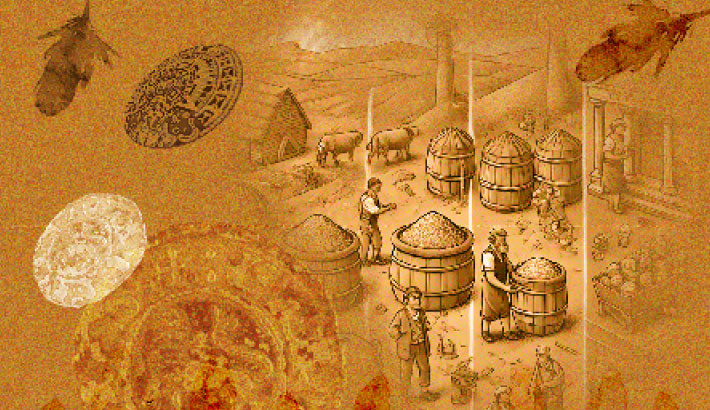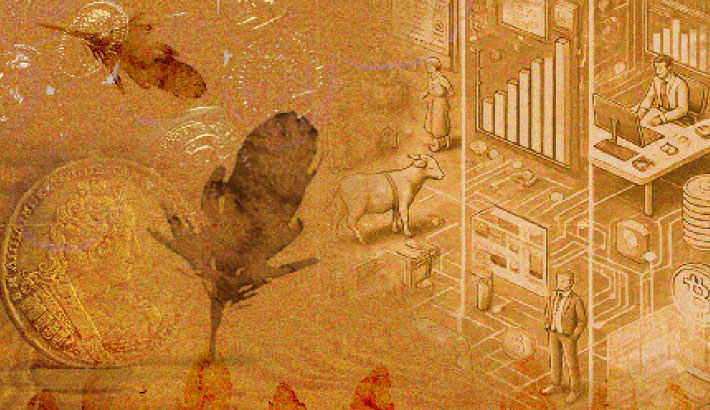
The way people save money has changed dramatically over time, shaped by shifts in economic systems, technology, and social structures. From stockpiling goods in ancient times to modern digital savings, the methods of storing wealth have continuously adapted to meet society’s evolving needs.
From goods to coins
Before the introduction of money, saving was all about physical goods. People stored surplus food, livestock, or valuable items as a form of wealth. In agrarian societies, stockpiling crops was essential to survive lean seasons. Tangible assets like these acted as a primitive savings system, but only those with excess resources could afford to save. For the majority, life revolved around daily survival rather than long-term financial planning.
The arrival of money—first in the form of coins and later paper currency—marked a turning point. Suddenly, wealth could be stored in a more standardised and convenient way. As economies became more structured, banking institutions emerged, offering a safer place to keep money. The introduction of interest-bearing savings accounts made banking more attractive, encouraging people to deposit their money instead of hiding it at home.

Banking and the digital revolution
The banking system evolved further with the rise of digital banking. Gone were the days when people had to visit a physical branch to manage their savings. Online banking and mobile financial services made saving more convenient, allowing people to transfer funds, check balances, and invest at the click of a button.
More recently, there’s been a shift towards investment-based savings. Instead of hoarding gold—a traditional method of wealth preservation—many now prefer to invest in stocks, bonds, mutual funds, and real estate to grow their surplus money.
For rural populations with limited access to traditional banking, mobile wallets and digital savings platforms have been game-changers. These technologies have expanded financial inclusion, giving the unbanked an opportunity to save securely and efficiently.
Cultural barriers and financial habits
Despite these advancements, many in Bangladesh still prefer to keep their savings at home rather than in banks. Mustafa K Mujeri, former chief economist of Bangladesh Bank and executive director of the Institute for Inclusive Finance and Development, explains, “Even in difficult circumstances, people try to save for emergencies. But a large portion of our population avoids banks due to excessive paperwork and hassle. As a result, banks miss out on significant deposits.”
Women in rural areas, in particular, tend to save small amounts but often feel uncomfortable using banks or mobile banking services. Mujeri suggests that banks could make these services more accessible by hiring female agents in rural areas, making financial institutions more approachable for women.
Md Arfan Ali, former president and managing director of Bank Asia, stresses the need for greater flexibility, saying, “People should be able to deposit any amount into their accounts without restrictions. Raising awareness about digital banking can also help make saving more accessible, particularly in today’s fast-paced world.”
What lies ahead?
Looking to the future, saving money is set to become even more digital and automated. Innovations like blockchain technology, artificial intelligence, and decentralised finance could reshape how people store and manage their wealth. Digital wallets and alternative financial systems may reduce reliance on traditional banks, giving individuals greater control over their savings.
There’s also a growing trend towards ethical and sustainable investing, where people align their financial choices with their values. As this movement gains momentum, future savings habits may be shaped not just by financial security, but by a desire to contribute to a fairer and more sustainable world.
From storing food in ancient granaries to using cutting-edge digital platforms, saving money has come a long way. And as technology advances, the ways we save will continue to evolve, making financial security more accessible for everyone.
Editor
Md Rezaul Karim Lotus
Executive Director
Tasvir Ul Islam
Magazine EDITOR
M Munir Hossain
Contributors
Mousumi Islam
Ariful Islam
Head of Marketing & Sales
Fokhrul Ahmed
Graphics
Md Delwar Hossain
Md Zahirul Islam
Md Abul Hasnat
PUBLISHED BY
Maynal Hossain Chowdhury
on behalf of East West Media Group Ltd.
from Plot: 371/A, Block: D, Bashundhara R/A, Dhaka-1229
PRINTED FROM
Plot: C/52, Block: K, Bashundhara
Khilkhet Badda, Dhaka

